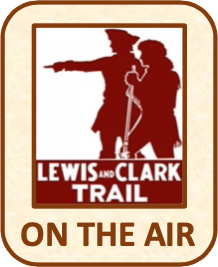Activator FAQs
Frequently Asked Questions
A
"Participant"
is a ham radio operator that is listening or hunting for one of the 16
states club call signs being activated for the LCTOTA event.
An
"Activator"
or
"Activating Station"
is one of the clubs listed on the LCTOTA home page that will be actively
calling CQ as one of the 16 states associated with the Lewis and Clark
trail.
Each club activating stations for LCTOTA has a signup administrator.
This person will be signing up the activating stations for their club
and passing on the names, call signs and email addresses to LCTOTA so
the stations can register to activate. They will also be your key
contact to coordinate the use of your club call sign for this event.
The signup administrator for your club will generate an email
from the LCTOTA website and invite you to sign up for an LCTOTA
Activator account.
After you receive the email invite, you will register with the
LCTOTA site and enter the dates, time and modes that you will
be activating. If you don't receive an email request with 2 days
of the event starting, please check your spam folder and contact
your club signup administrator.
If for some reason you email service blocks this invite, you club
administrator can manually copy the invite link and send it to you
from their email account.
Clubs are encouraged to use their own club signs. LCTOTA is not
requesting or promoting the use of special call signs. However, an
activating club can use whatever call sign permitted to them by the
call sign owner or trustee. Keep in mind, the call sign your club
uses to represent your state, will be the call sign shown on the
certificate.
No, however, it is good etiquette not to have two stations with the
same call sign on the same band and mode calling CQ at the same time. For
example, If a club was calling CQ on 20m SSB, CW and FT8/FT4 all at the
same time, that would be ok.
You can activate your station anywhere within the State your club
is registered in. For example, the Clark County Amateur Radio Club in
Washington State is on the Columbia River next to the State of Oregon
and has club members in both Washington and Oregon. Since a goal of this
event is to contact each state on the Lewis and Clark trail, we are
asking all CCARC members to activate in Washington State. If a member
wants to activate from Oregon, they need to contact the Oregon club
administrator and request permission to register with them.
Yes, providing you follow all the rules for a POTA activation. The POTA
rules for logging are fairly simple and the information required for
the log is similar to the LCTOTA event.
LCTOTA will not accept any paper logs. You will need to manually enter
your log into a logging program and create an ADIF file. Be sure when
you do this to verify your dates and time for each entry as most
logging software will default to the date and time the entry was made.
Once the ADIF file is created, you can upload it to the LCTOTA webpage.
The LCTOTA webpage for Activators has an option to allow the manual
entry of logged contacts or you can log directly to this webpage while
operating.
No, any logging software that can capture the exchange information
and creates an ADIF file can be used. An alternative to using any
software is to use the logging application on the LCTOTA webpage.
This allows for manually entering contacts in real-time or for
contacts be manually entered from paper field logs. When using
the LCTOTA webpage app, there is no need to create an ADIF file.
Use your login to access the signup schedule at the LCTOTA
webpage and modify the dates and times you will be operating.
All activating stations are to use the call sign for the club
they are registered with. These are the club call signs that are
listed on the LCTOTA web page and are what the LCTOTA
participants will be listening for when you call CQ. The use of
the club call sign for your club will be coordinated by your
club's Signup Administrator. The Signup Administrator will
coordinate with the club's license trustee to use the license.
Answer: When you sign-up to activate for your club, you will
have options to schedule time under your club call-sign or
the bonus station call-sign.
When activating for a Bonus Station, use the Bonus station 1x1
call sign.
Yes, The LCTOTA website will need two separate logs, one for each call sign.
LCTOTA will be promoting this on-the-air event through the ARRL,
social media and section newsletters. All activating stations
are encouraged to promote this event using their own means.
LCTOTA is only issuing participating certificates to those that
request one. LCTOTA is not issuing or sending any QSL cards.
Each participating club is free to send their own QSL cards.
The LCTOTA logo will be made available to all clubs
participating so they can create their own QSL cards. The LCTOTA
will also be providing a QSL Card with your club logo on it. Your
club is free to use this or use their own.
Yes, you can but you need to follow the following rule: the
location of the transmitter and antenna count for the state you
are activating. For example, if your transmitter and antenna are
in Washington State and you are operating remotely from your
apartment in Oregon, you need to be registered to activate as a
Washington State station with the CCARC of Washington and use the
W7AIA call sign.
